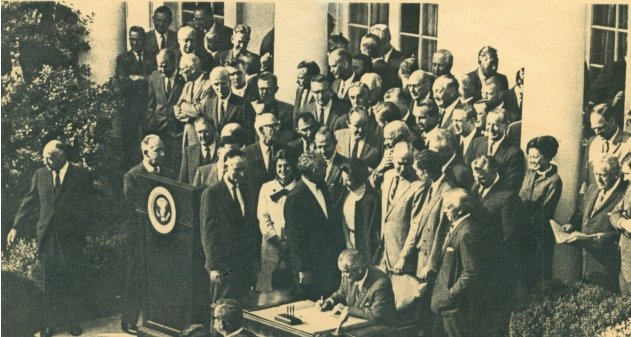 When Bill Ivey took the reins of the National Endowment for the Arts, he stepped into an organization in crisis.
When Bill Ivey took the reins of the National Endowment for the Arts, he stepped into an organization in crisis. “The agency was very controversial for a period,” Ivey said. “The culture wars, back in the early 1990s, really targeted our arts policy. There were grants made by the NEA that were deemed to be problematic by some members of Congress and advocates from some religious groups.”
A series of NEA-backed works were targeted by the fundamentalist Christian group the American Family Association as “anti-Christian bigotry.” The issue caught on with Republican senators Jesse Helms and Al D’Amato. GOP Rep. Dick Armey and conservative Christian figures like Pat Robertson and Pat Buchanan joined the attacks. When Ivey was appointed chairman of the NEA by President Bill Clinton in 1998, the administration was looking for a way to reshape the agency.
“I think the agency felt it would be helpful to reach out to the middle of the country and find a candidate for the chairmanship who was, perhaps, not connected with fine art but connected to American popular culture and try to use that as an opportunity to restart the agency’s relationship with congress and with its constituency around the country,” Ivey said.
Ivey, who chaired the NEA from 1998 to 2001, will be one of the featured speakers Friday at a free 50th anniversary celebration of the NEA and the National Endowment for the Humanities at the Wharton Center. It will feature several speakers, including past and current NEA/NEH leaders, and performances by poet Coral Brantley and singer/ songwriter Joshua Davis. The Lansing Art Gallery will curate an exhibit of Michigan artists in the Wharton Center lobby.
An Upper Peninsula native from Calumet, Ivey is one of the nation’s leading folklorists. He holds a master’s degree in folklore and ethnomusicology from the University of Michigan and did doctoral work at Indiana University. He served as director of the Country Music Hall of Fame and Museum in Nashville for 27 years before being appointed NEA chairman. His Midwestern roots were seen as an asset in the fight against accusations of elitism in the NEA. Ivey’s leadership helped guide the NEA out of the tumultuous 1990s, surviving multiple attempts to defund or eliminate the agency.
The NEA and NEH, both independent federal agencies, were created in 1965 under the administration of President Lyndon Johnson. They have pumped a combined $10 billion into arts and humanities projects nationwide.
Ivey believes that the cultural landscape in the U.S. would be much different without the two agencies.
“The nonprofit cultural sector would not be nearly as big as it is today,” Ivey said. “When the NEA was created, there were probably fewer than 7,000 cultural nonprofits in the U.S. Today there are over 120,000. That’s spectacular growth, and I don’t think it would have happened if you didn’t have the NEA in cooperation with the state and local agencies.”
The NEA and NEH work largely with regional and state arts organizations to help distribute their grant funding. In Michigan, the Michigan Council for Arts and Cultural Affairs is the main conduit for NEA/NEH funding. The goal of the council, explained Executive Director John Bracey, is not to back a certain art form or agenda, but to create opportunities to experience the arts and humanities.
“It’s about access,” Bracey said. “We’re not looking for the next Picasso or George Crumb or Yo-Yo Ma. We’re looking for organizations that can provide quality experiences for their communities. If an organization isn’t directly engaging their community, they have a much harder time getting funding from us.”
Bracey noted that the extensive vetting process required to receive an NEA/NEH grant helps nonprofits to attract new private donors. Many donors see the grants as a sign that an organization is well run and doing good work in the community.
“You can leverage that,” Bracey said. “It really helps these organizations.”
Paul Kotula, an MSU art professor, received NEA grants in 1990 and 1992. A ceramicist, Kotula used the grant money from the first award to purchase his first kiln. But more important than the money, Kotula said, was the prestige that came with the awards.
“The honor was tremendous,” he said. “It helped me get recognized in the field.”
While the NEA and NEH no longer offer the type of individual grants that Kotula received, he still sees the agencies as vital to the nation’s cultural life.
“I think the NEA/NEH do a wonderful job supporting projects,” Kotula said. “It sustains the arts in our country. Without these grants, we wouldn’t have art as we know it.”
NEA/NEH 50th Anniversary Celebration
7 p.m. Friday, Oct. 23 FREE Wharton Center 750 E. Shaw Lane, East Lansing (517) 432-2000, whartoncenter.com
Support City Pulse - Donate Today!
Comments
No comments on this item Please log in to comment by clicking here